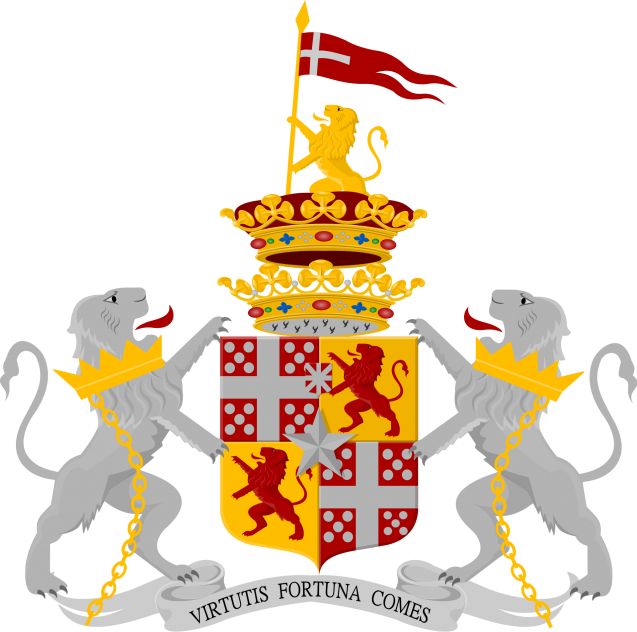During the First Empire, in 1808, Napoleon created an institution called the “majorat” in order to reward marshals, préfets, civil and military officers as well as others amongst his subjects who had distinguished themselves in the service of the State. Via this system whereby he distributed titles the Emperor established an Imperial nobility. These titles were endowed with estates taken from the “Domaine extraordinaire” [Extraordinary Domain], either lands conquered abroad or those confiscated by the State. Taking his inspiration from this procedure, the sovereign of the Netherlands, William I, decided to offer a reward to the Duke of Wellington, shortly after the Battle of Waterloo, for having “saved” his “new” kingdom (ratified by the Congress of Vienna on 9 June 1815).
On 8 July 1815, William granted the Duke the title of “Prince of Waterloo”, which was transmissible to his descendance by male primogeniture. Later, the Estates General of the Netherlands, by a decree of 29 September 1815, conferred on him (as well as to legitimate heirs to the title), irrevocably and in perpetuity, the possession of 1,083 ha of State woodland confiscated from religious institutions during the Revolution. This property was intended to provide him with a comfortable annual income allowing him to lead a life fitting to his princely rank. This was known as the “Wellington endowment”, which was subject to the legal principles of the Napoleonic ‘majorat’.
These lands are located between the town of Nivelles and the hamlet of Les Quatre-Bras, south of Brussels. The battlefield itself was not chosen because it was owned by local farmers. When the woodland was cleared in 1817, at the Duke’s request, he received a “public” rent, which was later (1988) converted into full ownership of 25 ha, taken from the endowment.
Juridically, a “majorat” is a property with two important restrictions:
– on the one hand, the property is “inalienable”: the holder is assured a stable income but should not speculate on the property. He may not cause the property to be seized, he may not mortgage it or sell it to pay his taxes.
– on the other hand, this property ceases with the extinction of the title (in this case, that of “Prince of Waterloo”) to which it is attached, which in this case would entail the right of the return of the property to the “Domaine Extraordinaire”, namely, to the State. But in practice, succession by male primogeniture has not always been devolved to the direct descendant. This principle has been interpreted “broadly”.
The “majorat” is not strictly speaking a usufruct, and it is by mistake that the title owner’s right was often assimilated to one in the past. This confusion probably arose because, for the payment of inheritance tax, the Duke of Wellington is treated as a usufructuary, in that he is not allowed to sell the property and receives only the income from the endowment. For the rest, he pays income tax in Belgium like any citizen, and costs nothing to the Belgian State.
When Belgium became independent from the United Kingdom of the Netherlands in 1830, these provisions with regard to the Duke were preserved, especially since at the time he was the Prime Minister of Great Britain, itself the guarantor of Belgium’s independence. In addition, in 1831, it was a relative of the British royal family, Leopold of Saxe-Coburg and Gotha, who became king of the Belgians [Leopold I of Belgium]. This reinforced the existence of the endowment within the framework of the new Belgian constitution which adopted the ennoblement, without any special privilege being attached to the title. Today, the title of “Prince of Waterloo” and the corresponding “Wellington endowment” are legally the only “majorat” in Belgium inherited from the Netherlands.
Currently, the Duke receives an average of €125,000 per year in rent, leases and hunting rights from the 83 farms established on his land. This income is considered as a usufruct and taxed annually. In addition, in the event of a change of ownership within the Wellington family, the heir is required to pay Belgian inheritance tax, as a non-resident, of up to 60%. But as he cannot freely dispose of his property, he has to borrow in order to meet his obligations.
The endowment “protects” the land from residential or industrial development, which is, of course, good news for the farmers who work the land and pleases conservationists. This is perhaps also the reason why no-one is suggesting that the Belgian State buy back this land, whose current value has been calculated at more than 120 million euros.
Christian Christoff, Guide for the association “1815-Waterloo”
May 2018 (translation RY)


